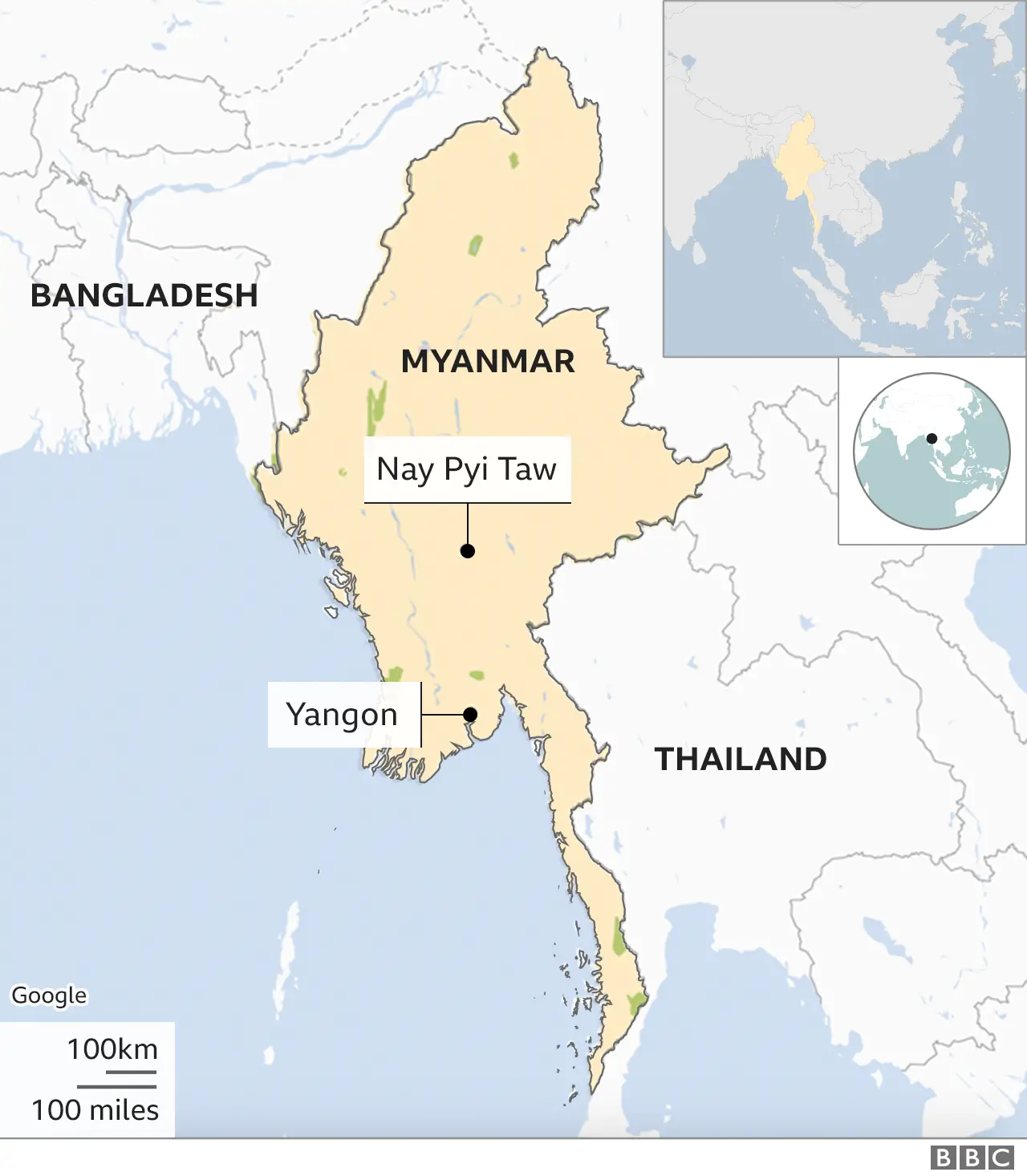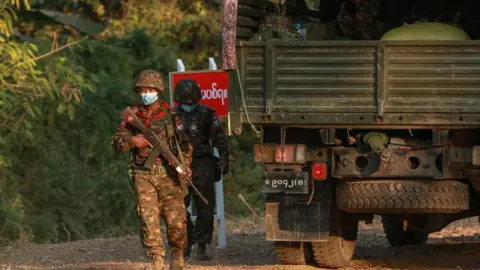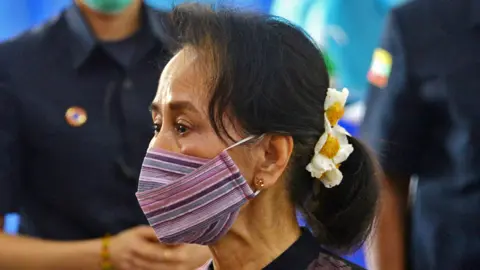Myanmar coup: Medics to strike as anger at military grows
Resistance to Monday's army takeover in Myanmar is growing, with residents of the biggest city Yangon banging pots and pans, and honking car horns.
Medical staff in several major cities are planning strikes, while activists are calling for a campaign of civil disobedience.
However, correspondents say the military appears firmly in control.
Calls are growing for the release of elected leader Aung San Suu Kyi, who has not been seen since her detention.
Over 100 lawmakers had been confined by the military in their accommodation in the capital, Nay Pyi Taw, but have now been told they can leave.
The military took power in the early hours of Monday and declared a year-long state of emergency after accusing Ms Suu Kyi's party of fraud over its recent election win.
Her National League for Democracy (NLD) has demanded her immediate release. It also called upon the military to accept the results of the November election, which saw the NLD win more than 80% of the votes.
However, the military has appointed a new election commission and chief of police. The previous commission found no evidence of election fraud.
Myanmar, also known as Burma, was ruled by the armed forces until 2011, when a nominally civilian government was sworn in.


What is happening now in Myanmar?
The country was calm in the aftermath of the coup, with troops patrolling all major cities and a night-time curfew in force. Communications systems disrupted by the coup returned by Tuesday morning.
But as night fell on Tuesday, car horns and the banging of cooking pots could be heard in the streets of Yangon in a sign of protest.
Youth and student groups also called for civil disobedience campaigns, and a Facebook page for the campaign gained over 100,000 likes.
Doctors working in government hospitals said they would stop work from Wednesday to push for Ms Suu Kyi's release.
Some medics are resorting to wearing symbols in silent protest.
Allow X content?

At least one doctor has quit in protest, saying "such coups cannot be tolerated at all".
Dr Naing Htoo Aung, a 47-year-old anaesthesiologist at Mongywa Hospital in Sagaing Region, told BBC Burmese: "I resigned because I couldn't work under a military dictator who did not care about the country and the people. This is the best response I can give to them."
 Reuters
ReutersAnother doctor involved in the campaign, Myo Thet Oo, told Reuters news agency: "We cannot accept dictators and an unelected government.
"They can arrest us anytime. We have decided to face it... All of us have decided not to go to the hospital."
Power has been handed over to commander-in-chief Min Aung Hlaing. Eleven ministers and deputies, including those in finance, health, the interior and foreign affairs, were replaced.
In the first meeting of his cabinet on Tuesday, Min Aung Hlaing repeated that the takeover had been "inevitable" after the military made allegations of electoral fraud.
Where is Aung San Suu Kyi?
There have been no official statements on Ms Suu Kyi's exact whereabouts since she was detained in pre-dawn raids on Monday.
But unnamed sources from within the NLD have said both she and President Win Myint were being held under house arrest.
 Getty Images
Getty ImagesMs Suu Kyi - who spent nearly 15 years in detention between 1989 and 2010 - has urged her supporters to "protest against the coup" in a letter written before she was detained. It warned the military's actions would put the country back under a dictatorship.
She was barred from becoming president because she has children born to a foreign national. But since the NLD's decisive election victory in 2015 she has been widely seen as de facto leader.

Myanmar at a glance
Myanmar is a country of 54 million people in South East Asia which shares borders with Bangladesh, India, China. Thailand and Laos.
It was ruled by an oppressive military government from 1962 to 2011.
Nearly all expressions of dissent were banned and accusations of severe human rights abuses led to international condemnation and sanctions.
Aung San Suu Kyi spent years campaigning for democratic reforms. A gradual liberalisation began in 2010, though the military still retained considerable influence.
A government led by Ms Suu Kyi came to power after free elections in 2015. But a deadly military crackdown two years later on Rohingya Muslims sent hundreds of thousands fleeing to Bangladesh and triggered a rift between Ms Suu Kyi and the international community.
She has remained popular at home and her party won again by a landslide in the 2020 election. But the military have now stepped in to take control once more.

How has the world reacted?
US President Joe Biden has threatened to reinstate sanctions on Myanmar. He said the military should not "overrule the will of the people". Later the State Department declared events in Myanmar to be a coup and said it would review foreign aid to the country.
Along with the US, the United Nations, the UK and the EU have also condemned the military takeover.
UK Foreign Office minister Nigel Adams said he hoped a phone call planned with Ms Suu Kyi later this week would go ahead to confirm her safety.
It is unclear though how much effect the warnings from Western countries will have. The coup leaders will have expected sanctions and factored those into their plans.
China, which has previously opposed international intervention in Myanmar, urged all sides in the country to "resolve differences". China's Xinhua news agency described the changes as a "cabinet reshuffle".
Other countries in the region, including Cambodia, Thailand and the Philippines, have said it is an "internal matter".
